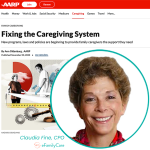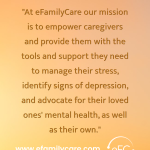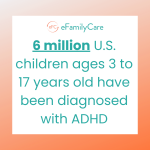
No one said caregiving was easy, but most people don’t realize the incredible sacrifice it takes to be a caregiver. Caregivers invest time, money, and an immense amount of energy into caring for an Aging Loved One. There are several challenges that are unique to caregivers. By recognizing these challenges, caregivers are less likely to neglect their own needs. A caregiver who is prepared for the challenges, and putting a priority on their own wellness, is a caregiver who can best serve others. Here are 5 challenges faced by caregivers.
1. Isolation
Being a caregiver can be extremely time-intensive, particularly for caregivers who also maintain a job in addition to their caregiving responsibilities. When so much of one’s time is spent caring for another person, isolation can be quite common. It is hard to make time to do things that they did previously or, for that matter even think about things that were important prior to being a Family Caregiver.
Isolation is a precursor to burnout, so it is vital that caregivers schedule some time in their busy schedules with a friend, going to see a movie, or even just taking a walk. This will greatly improve the caregiver’s health, and in turn, improve outcomes for the person receiving care.
2. Caregiver burnout
Burnout occurs when a caregiver completely neglects their own needs and focuses 100% of their energy on the person for whom they are caring for. Although we tend to think of “selflessness” as a good thing, it can be quite harmful. Just as burnout happens to those who overwork themselves in other careers, the exact same thing can happen in caregiving. Eventually, a caregiver neglects their own needs so dramatically that they become physically and emotionally exhausted and, ultimately become unable to provide care for the person they care for. Caregiving burnout is very common. It is important for caregivers to recognize the signs of burnout — exhaustion, fatigue, withdrawal from friends, and irritability.
3. Little to no professional resources
Caregivers are often family members with little or no medical experience. Lack of resources can make caregiving scary, particularly when navigating complex situations and making important decisions that will affect the health and wellness of an Aging Loved One. Many caregivers experience added stress when making important medical decisions because they do not have access to a reliable support and resources.
4. Financial strain
In addition to being an unpaid caregiver, there are often many expenses that fall onto the shoulders of those providing care. Family Caregivers who are providing both caregiving and financial support to an Aging Loved One report even often higher levels of stress.* A professional care adviser can help identify options that are in the best interest for the person being cared for, while also making financial sense.
5. Lack of support
A common challenge reported amongst caregivers is a lack of support. Support systems are key in preventing burnout and providing the best care for a loved one suffering from a physical or mental handicap. It is so important for caregivers to recognize when they need support — should it be from other caregivers, family, friends, a therapist, or a professional care adviser.
eFamilyCare can provide support
eFamilyCare Professional Advisers are not only there to provide you with information and resources, but they are also there to listen and partner with you as you navigate complex situations. In addition, they are readily accessible. You will never be alone with tough decisions. Not only does this help reduce isolation, but it will also empower you to feel and be a competent caregiver. This leads to less stress and better outcomes for your Aging Loved One and you! Learn more about eFamilyCare by scheduling a discussion with us today.
The Lewin Group. (2002). The national family caregiver support program resource guide. Falls Church, VA: Author.
/87 Kaye, L.W., Turner, W., Butler, S.S., Downey, R. & Cotton, A. (2003). Early intervention screening for family caregivers of older relatives in primary care practices. Family Community Health, 26(4): 319–328.







